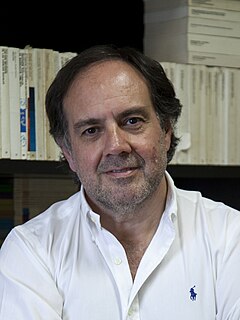Manuel García Pelayo, prominent Spanish political scientist and jurist. He was the founder of the modern Department of Political Science of the Central University of Venezuela and was elected President of the Constitutional Court of Spain in 1980.

José Ramón Montero is a professor of Political Science at the Autonomous University of Madrid and at the Centro de Estudios Avanzados en Ciencias Sociales, Juan March Institute, Madrid. He obtained his Ph.D. in Law at the Universidad de Santiago, and has taught at the Universities of Granada, Santiago, Zaragoza, Cádiz and Complutense de Madrid.
Josep Joan Moreso graduated in Law from the Universitat Autònoma de Barcelona (1983) where he also completed his PhD (1988), achieving high-class honours in both instances. He has held teaching posts at the Universitat Autònoma de Barcelona (1988–1995); the Universitat de Girona (1996–2000) and the Universitat Pompeu Fabra (2000–2005). Rector of the Universitat Pompeu Fabra from May 2005 to June 2013. In October 2010, he was invested as doctor honoris causa of the Valparaíso University (Chile).

Jorge Alberto Lozoya Legorreta is a Mexican diplomat with broad experience in international cooperation and cultural affairs. He has also been associated with some of the top Mexican and international academic institutions, with special interest on Asian civilizations and prospective studies and international negotiations.

Daniel Esteban Herrendorf is an Argentine writer, essayist and philosopher.
Bartolomé Clavero Salvador is a Spanish jurist and historian, specialized in legal history.

John of Castile, called the "el de Tarifa" was an infante of Castile and León. He was engaged in a decades long fight for control over the Lordship of Biscay with Diego López V de Haro, the uncle of his wife.

Luis Moreno. Journalist, sociologist, and political scientist, he is Research Professor at the Spanish National Research Council (CSIC).

Leonardo Morlino is full professor of Political Science at LUISS University, Rome. Between 2009 and 2012 he was the first Italian President of the International Political Science Association. He wrote extensively about the changes of political regimes, democratization processes and the quality of democracy of different areas of the world.
Luis Díez del Corral y Pedruzo was a Spanish jurist, writer and political scientist. He was legal counsel and a deputy in the Spanish Cortes from 1943–49, during the first legislative sessions of the Franco Period and was the chief of the "Section for Corporate and Social Management" of the Institute for Political Studies.
Spanish Alternative is a nationwide Spanish Catholic political party, whose ideology is framed within the conservative right-wing. It describes itself as "social Christian and cross-sectional". Its Secretary General is the lawyer and businessman Rafael López-Diéguez, former member of the far-right New Force, active formation during the Transition and managed by his father-in-law, the historic leader Blas Piñar, who was named honorary president of AES, a post which he held until his death in January 2014. Although AES doesn't use symbols of Franco's regime, the party has been described as neo-francoist as well as being considered to be inheritor of New Force. It maintains contacts with the party Navarrese and Spanish Right (DNE).
Joan Oliver Araujo is a Spanish author, who holds the chair of Constitutional Law in the University of the Balearic Islands (UIB).

Maurism was a conservative political movement that bloomed in Spain from 1913 around the political figure of Antonio Maura after a schism in the Conservative Party between idóneos and mauristas ('maurists'). Its development took place in a period of crisis for the dynastic parties of the Spanish Restoration regime. The movement, which fragmented in several factions in the 1920s, has been portrayed as a precursor of the Spanish radical right.

Antonio Alcalá Galiano y Fernández de Villavicencio, was a Spanish politician and writer who served as Minister of the Navy (1836) and Minister of Public Works (1865). He was elected a Deputy for Cádiz in 1822 and served sporadically through ten successive legislatures, until his death.

Ismael Crespo Martínez is a political scientist and expert in Latin America, Professor of Political science at the University of Murcia, Spain, and director of the Department of Political Science and Administration at the same university. In addition, he runs MásPoderLocal, a digital magazine on political communication and electoral behavior focused on Spain and Latin America. Since 2012, he is the president of the Latin American Association of Electoral Campaign Researchers.
CEISAL is a network of the main institutes and specialised centres in Latin American studies, and national associations of social research on Latin America in Europe. It consists of 51 members representing 19 European countries. It is a plural and critical space for reflection from the different fields in Social Sciences in order to broaden the knowledge of the social, cultural, economic and political realities.

José María Salaverría e Ipenza (1873–1940) was a Spanish journalist and writer.

Laura Nuño Gómez is a Spanish political scientist, researcher, and feminist activist. She is director of the Gender Studies Chair of the Institute of Public Law and the Gender Equality Observatory at King Juan Carlos University (URJC), as well as the creator of the first academic degree in Gender Studies in Spain, and of various postgraduate programs in this subject. She is the author of El mito del varón sustentador, as well as about 30 articles and books about her research. Since the enactment of the Law for Effective Equality of Women and Men, she has been one of the three expert members of the State Council for the Participation of Women.














